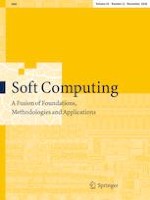13.05.2020 | Methodologies and Application
A design of information granule-based under-sampling method in imbalanced data classification
Erschienen in: Soft Computing | Ausgabe 22/2020
EinloggenAktivieren Sie unsere intelligente Suche, um passende Fachinhalte oder Patente zu finden.
Wählen Sie Textabschnitte aus um mit Künstlicher Intelligenz passenden Patente zu finden. powered by
Markieren Sie Textabschnitte, um KI-gestützt weitere passende Inhalte zu finden. powered by
